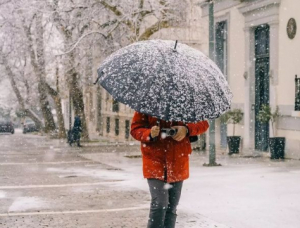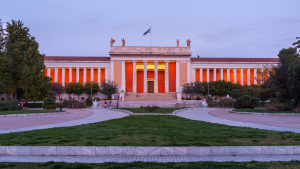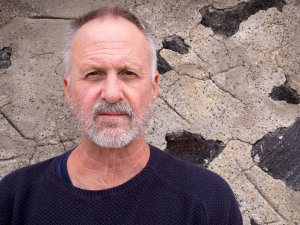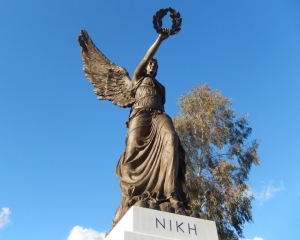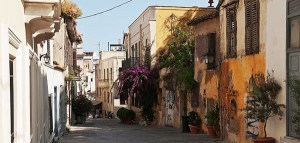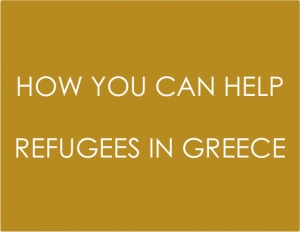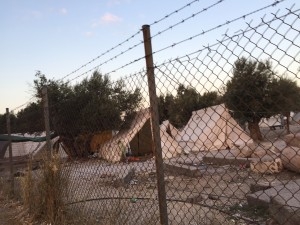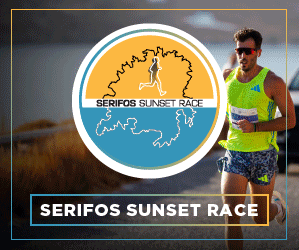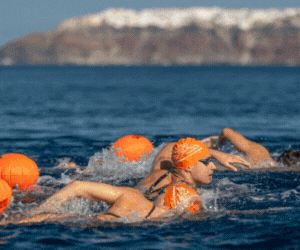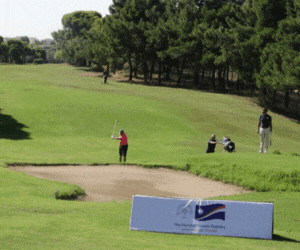“We have found that our genetic code can be interpreted in two different ways, not just one,” said the leading Greek researcher commenting for the first time on this fundamental discovery, which was featured in the winter edition of the scientific "Science" magazine and is predicted to change biology as we know it.
"While we knew about the existence of a second, functional, code from the 80′s, we couldn’t locate where this code was hidden in the genome. We now discovered that the functional code is not located in a separate part of the genome, but an important part of this information is written onto our already known genetic code. The functional proteins, therefore, also read our genetic code, but differently," added the professor from Greece.
XpatAthens
Dial 112 In Case Of Emergency In Greece & EU
112 is an integrated emergency communications service, which includes an inbound and an outbound component. In case of emergency, individuals can dial 112 for free from anywhere in Greece and the European Union.
The outbound component allows the reception of warnings via multiple technologies and communication channels in case of an imminent or occurring dangerous situation so that individuals can take the protective actions required to stay safe.
How To Use 112 In Case Of Emergency
Individuals in the EU need only to remember this emergency number to reach any emergency service. 112 is particularly useful for anyone who finds themselves in distress and needs emergency assistance while traveling within the EU.
The number is available in all EU member states alongside the domestic emergency numbers. However, some EU countries have opted for 112 as their single emergency number.
In Greece, 112 is available 24 hours a day, every day. By dialing 112, the caller can be connected to:
- Police
- Fire Brigade
- Emergency Medical Services
- Coast Guard
- the European Hotline for Missing Children 116000
- the National Helpline for Children SOS 1056
- Text message (SMS) or MMS to 112.
- Email contact@112.gov.gr
- Through the Gov.gr application.
When dialing 112, the emergency call taker will ask for the location of the emergency and questions to determine whether you need police, fire, medical, or other assistance. When reaching 112 by text message or email please make sure to include the following information on your message:
- What is your emergency?
- What is the location of the emergency?
- Are there any casualties?
The public authority having jurisdiction for 112 in Greece is the General Secretariat for Civil Protection.
For more information on the operation of 112 in each EU country, please click here
Amazing Pictures Of Athens & The Greek Islands Covered In Snow
The heavy snowfall has caused many problems both in Athens and the islands, as Greece, a sunny country, isn't used to coping with such extreme weather events. For this reason, the government announced that Tuesday, January 25th, is to be considered a holiday for all workers in both the private and public sectors.
All the problems aside, however, many enjoyed the weather and were eager to capture the magical, snowy moments! Here are some of our favorite pictures of Athens and the Greek islands blanketed in snow, looking like they are straight out of a fairytale!
Acropolis - Athens
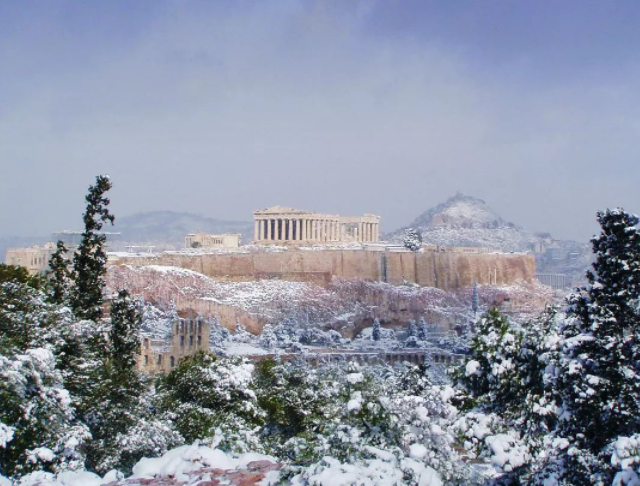
@andreas_megos
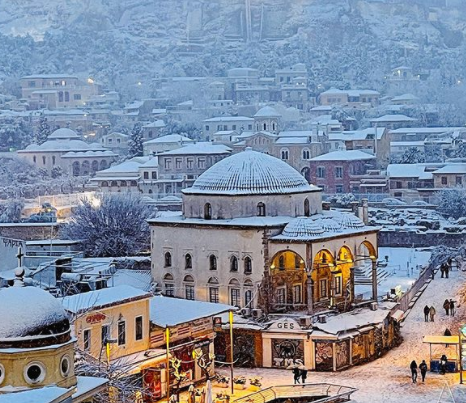
@athensvibe
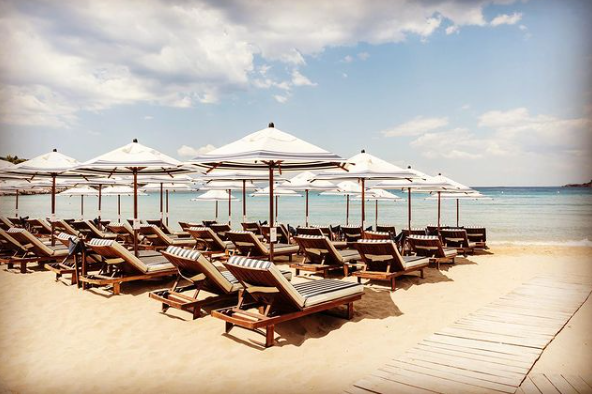
@spathumpa
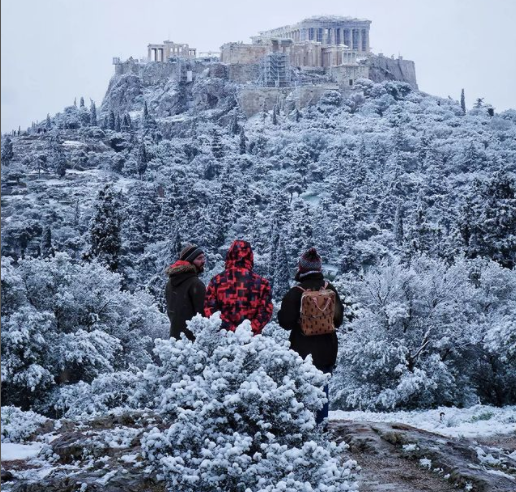
@tom_tsou
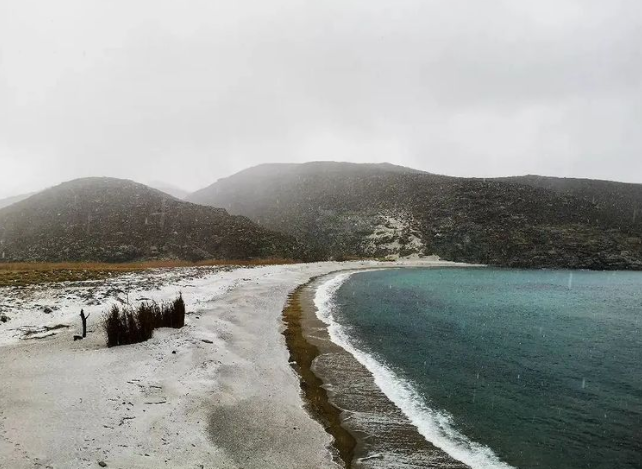
@markisia.photography
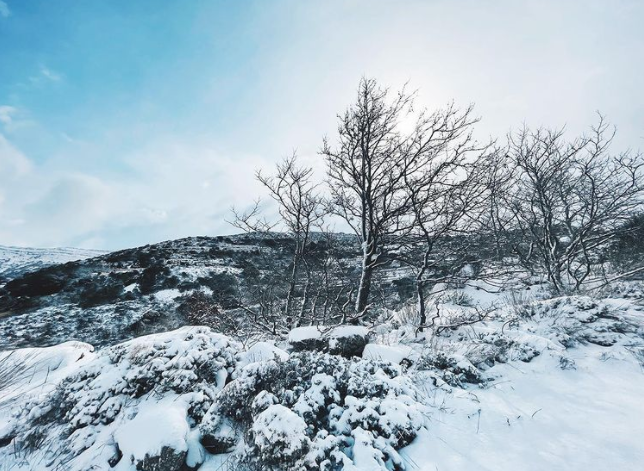
@milona_katerina
Neimporio - Andros Island
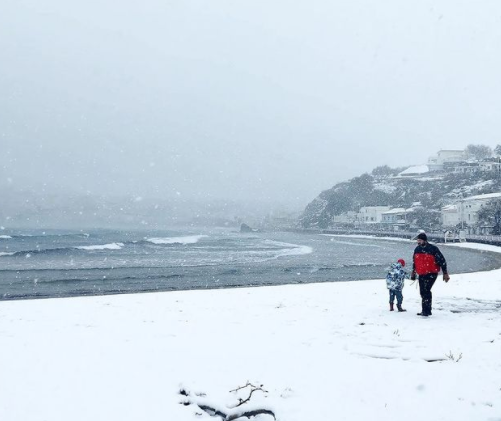
@georgekolidas
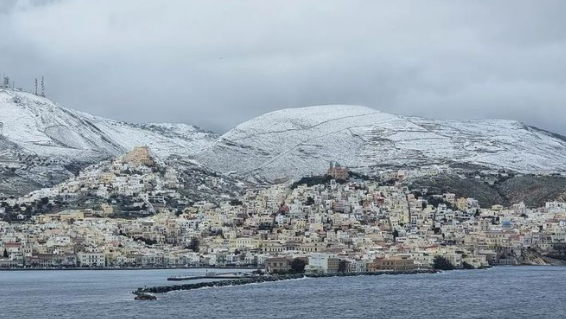
@visit.syros
📸 Main image: @amaliakovaiou
Archaeological Museum Enters Digital Age
Writing With Purpose: Timothy Jay Smith On Greece, Social Justice & Storytelling
After reading Fire on the Island, a suspenseful, heartfelt novel set in a Greek village, I was immediately intrigued by the man behind the story. My review barely scratched the surface of what Timothy Jay Smith brings to the page, and I couldn’t help but want to learn more about this fascinating writer and person.
So, we sat down for a long and heartfelt conversation. Timothy opened up about his life, his work, and his enduring bond with Greece. From planting tens of thousands of trees in Tanzania to founding a prize for political theater, to crafting layered characters drawn from real people, he offers the kind of perspective only a true global citizen can.
We began with the big question...
I’d say for myself: empathetic. I care about people, especially the disenfranchised and that has motivated drives what I do.
For Greece: welcoming.
Thank you, Tim, for sharing your stories, your passion, and your heart with us. It’s been a pleasure getting a deeper look into the life behind Fire on the Island, and the purpose behind every page!
Want to learn more about Tim? Visit his website and grab your copy of Fire on the Island HERE!
Twas the Night Before Christmas…
…and all through the house, not a creature was stirring, except the kids knocking on the door singing the ‘kalanda’… Is it rude if I don't open the door every single time? Now, with Christmas around the corner, I am moments away from jumping into the car and exiting the city. This year I’m spending a few days in my father’s village, sleeping in past 7:00am, and letting my aunt pamper me with all kinds of food. My Christmas present this year will surely be a collection of new kilograms.
But before I leave, I need to run out to pick up a couple of last-minute gifts. This Christmas will be quite modest, I admit. Gifts are still the order of the day, but with an obvious ‘low key’ and ‘low cost’ feel. And I’m very much ok with that. For me, it’s not a ‘sign of the crisis’ as much as it’s ‘the way things should be’. Who ever said that Christmas was the time of year to buy your brother-in-law a new smartphone?
Which is why I am doubly surprised at the throngs of people that are crammed shoulder-to-shoulder on Ermou St. I have never seen so many people out shopping. I wonder if maybe they didn’t get the memo about the low-key Christmas trend. What are they all doing??
But then I look more closely. Most of them are not carrying many (any!) bags. The stores are packed, but the line at the cash registers isn’t so long. In fact, it’s the cafes and tavernas that are the most packed. Most of the people seem to just be out, with family or friends, walking around the shop-lined streets, looking up at the lights, window shopping and enjoying the vibe, the proverbial Christmas spirit.
And although I suppose it could make me sad, it has the opposite effect. There is a smile on my face, because I think that – when you subtract the gifts and the money spent on stuff we don't need - the vibe of Christmas is what people love. The colourful lights, the music, the crowds, the time with loved ones, the chilly weather – and the warmth of it all. For those of us lucky enough to have at least this much, it’s already enough.
My warmest wishes to the XpatAthens community – Kala Xristougenna!
Until next week,
Jack
In this weekly space, keep up with ‘Jack’ as he navigates daily life in Athens… Anecdotes, stories, hits & misses, the good, the bad and, well, the rest…
Biking The Magnificent Marathon Region
On a recent sunny Sunday in December, my partner and I went cycling in the Marathon region northeast of Athens. The beauty of the ride is that it combines amazing history with a bike route capable for any reasonably fit rider. We parked the car at the conveniently located Schinias Rowing Center which is open from dawn to dusk and equipped with washroom facilities. The place was lively with kayakers plying the lake waters and runners racing to the finish line of a competition in progress.
Our biking itinerary made a giant loop totaling 30 kilometers. The excursion took two hours of actual cycling but lasted four to five hours because we were compelled to stop and explore the marvelous points of interest, as well as, eat lunch at a seaside fish taverna.
The first antiquity we came upon was the Nike Trophy, a reconstructed marble obelisk located near the spot where in 490 B.C. the Athenians amazingly defeated the Persians even though outnumbered three to one. (Nike means “victory” in Greek). In contrast to trophies in battles between the Greek city-states in which the armor of the defeated was hung on a tree trunk, the trophies of the Persian Wars were grandiose monuments.

The bike route runs through an agricultural area entirely flat and minimally trafficked. We pedaled past fields of cabbage big as basketballs and broccoli with sprawling leaves fit for a rain forest. We saw fire engine red tomatoes, orange orchards and vineyards looking forlorn with grapes no longer adorning their vines. Farmers sold fresh produce at colorful roadside vegetable stands.
Eventually we arrived at the grassy enclosure of the Marathon Tomb (entry fee three euros). The Greek soldiers’ burial had been lost to history until 1890 when it was rediscovered, excavated and now rises as a swollen green mound (“soros”). This is the precise spot where 10,000 Athenians and 1000 allies from Plateia in central Greece defeated the mightiest super power of the day, the 30,000 “immortals” of the Persian army who prior thereto had only once before been vanquished in war. The battle lasted an hour and resulted in the deaths of 6400 Persians and only 192 Greeks. The enormous confidence enveloping the Athenians by their colossal victory gave them the greatness necessary to create all the extraordinary elements by which they gave birth to Western Civilization.
From the Tomb it is a quick fifteen minute ride further inland to the Archaeology Museum of Marathon. One usually thinks of museums in an urban setting but this one is located in an isolated rural environment where tranquility reigns. The prize of the museum is the original Ionic capital of the Nike Trophy. Also exhibited in the small building are pottery from the Cave of Pan and impressive four meter high “kouros” statues from a nearby Egyptian sanctuary. The remnants of that ancient sanctuary lie along the coast in Nea Makri and that is the next destination we biked to upon leaving the museum.
It was glorious to reach the Aegean Sea and bike along the wide coastal walkway that stretched from Nea Makri to Marathon’s sea front about eight kilometers away. En route you could glimpse the Egyptian sanctuary through a locked gate but there were only archaic foundations, no marble statuary. Next to it lie the ruins of a 3rd century AD villa built for the Roman Herodus Atticus, but also inaccessibly gated. Families and couples were strolling along the sidewalk, some jogging, a few brave souls swimming and many feasting at the outdoor tavernas with front row seats to the sea.
We finally made it back to the Schinias Rowing Center but there was still light in the day and we had not exhausted ourselves. So we continued eastward to the Schinias National Park, a rare aquatic ecosystem in Attika consisting of thirteen square kilometers of springs, swamps, streams, a lake and pine forested beach front. We climbed the tall ranger tower to admire the magnificent view of the sea and mountains in the distance; here birdwatchers seek a glimpse of over one hundred species inhabiting the park, along with foxes, badgers, hedgehogs, rabbits, reptiles, turtles and frogs. Biking on dirt paths in the wetlands, not a soul in sight, at times it honestly felt like we were hundreds of miles from civilization, be it modern or ancient.
By Colleen McGuire
Managing Director of cyclegreece.gr
2nd Code Hidden in DNA, Reveals Greek Scientist
A second code hiding within our already known genetic code, or DNA, has been discovered by the scientific team led by Greek Professor of Genome Sciences and Medicine at the University of Washington in Seattle, John Stamatoyannopoulos. This second code contains information that changes how scientists read the instructions contained in DNA and interpret mutations to make sense of health and disease.
How The Athens Suburbs Got Their Names
Zografou: The municipality of Zografou is one of the best known areas of Athens and owes its name to Ioannis Zografos, a man who used to own a large land outside the center of Athens in the early 20th century and sold it in small plots to 100 families, who then formed the Zografou community (back at the time they used to say that someone lived on the Zografou estate). Later on, one of Zografos’ sons, Sotiris, became the first mayor of the municipality.
Psyri: The gentrified neighborhood of Athens was named after an islander from the island of Psara (which was called in the Middle Ages Psyra) arrived in the area and built a church to honor St. Athanasios. The man was called by the locals Psyris (meaning Psarianos, someone from Psara) and in turn the area was renamed into “Psyri” and not “Psirri” (with a double r) as commonly mistaken today.
Kolonaki: The prestigious neighborhood of Kolonaki got its name from a small column set in the central square of the area by the people of Athens during the Ottoman rule in order to pray to God to help them survive the plagues and illnesses of the time. The small column has a diameter of 30 cm and height of 2 m.
By Stella Tsolakidou
Refugees In Greece ~ How You Can Help!
We've done our best to collect accurate information and although some of these initiatives are by organizations, do keep in mind that many of them have been organized by individuals in the community. The information below has been gathered via various social media pages and we'd like to thank everyone for making these posts available. (Note: The information has been outlined in random order.)
If you would like to add an initiative to this article or send us an update, please send a detailed email to ideas@xpatathens.com.
Individual Initiatives:
A) St Paul's Anglican Church in Athens: Contact Fr Malcolm Bradshaw - anglican@otenet.gr
B) To send donations to Thessaloniki: Please send parcels to Craig Wherlock, Oikopolis, Ptolemaion 29a Thessaloniki.
To send parcels to Lesvos: Please send parcels to Eric Kempson, Eftalou, Molyvos, Lesvos, Greece, 81108.
* All donations small or large are appreciated. Baby milk, diapers, wipes, sanitary pads, soap, track suit bottoms for men and women and underwear are all needed.
C) Donations Needed - Small easy to carry activity kits for refugee children. Contact: Eileen Botsford Mmc at activitykitsforrefugeekids@gmail. Also see: https://www.facebook.com/ebmmc/posts/10156049897995541:0. New drop off collection box set up thanks to our volunteers and Women's Care Medical Group Practice: Sorou 3-5 Marousi - Map: http://bit.ly/1WvUv8q
D) From the Greek Forum for Refugees ~ items needed and collection addresses:
Items Needed:
Long lasting food:
Rusks, biscuits, water, evaporated milk, juice, oil, meat, pasta, rice, pulses, evaporated milk, juice, tomatoes, canned, sugar, etc
Clothes: mostly for men and children.
Baby products: baby milk, bottles, creams, wipes, diapers, hats-Sport Shoes
Sheets / Towels
Toiletries: toilet paper, sanitary napkins, toothpaste, toothbrushes
Medical supplies: gauze, bandages, normal sera, antihistaminic ointments, antiseptic, adhesive dressings for wounds, cooling spray for wounds.
Locations and hours you can send your offers and contact numbers:
1. Greek Forum of Refugees
Contact info: 2130282976, 6948408928
You can send or bring the your offers directly to our office Gravias 9-13 Athens ZIP: 10678 from 11-5 pm
2. Solidarity4all. Contact Info: 2103801921. You can send or bring any of your offers that are included in the list above, EXCEPT from clothing, to our offices 74 College, Athens, from 10 to 5 pm
3. KYADA. Contact Info: 2105246516. You can send or bring your offers directly to our office Sofokleous & Pireos 35, Athens from 9-3 pm
E) The Charitable Arm of the Orthodox Church called Apostoli, has organised two "Banks" for the collection of Pharamaceuticals and Toiletries. From there they will be distributed to the areas of most need and where they are already in action.
Pharmaceuticals and medicines should be brought to: Social Pharmacy of Apostoli-Municipality of Kallithea Andromachis 100 (Ανδρομάχης 100) Kallithea. Contact Persons: Mrs. Ioanna Kolotourou & Mrs. Antigoni Tsortou Tel. 210-9532712
Items required include: Medicines for diabetes (for example Glucophage tablets) or Medicines for stomach (for example Losec or penrazol type) plus items you would take for travelling - eg Paracetemol, Imodium, Cetavlon, Iodine, maybe cough sweets - Soothers (or the Greek equivalent), medicines for children, plasters etc.
Toiletries should be taken to: Apostoli HQ. 8, Hera str. & 37, Despos Sechou str. GR-11743 Athens (Neos Cosmos) Nearest metro Sygrou-Fix. Contact Person: Dr. Vasileios Meichanetsidis, JCD
Items needed include: Toothbrushes and Toothpaste, Shampoo, Soap, Wipes for Adults and Children, Handwash, Shower Gel, Disposable Nappies, Feminine Hygiene products, etc.
Groups & Organizations:
Note, many of these groups are in Greek, but you may contact them in English in order to get involved.
Amurtel Hellas
This group works in the camps with pregnant and birthing women as well as mothers and infants.
Contact email: amurtel.gr@amurtel.org
Greek Forum of Refugees
http://www.refugees.gr/en/
https://www.facebook.com/Greekforumofrefugees
Refugee Air - Let Them Fly
http://refugeeair.org/
Αλληλεγγύη στους πρόσφυγες - Solidarity with Refugees in Greece
Helping Hands Greece
http://www.helpinghands.gr/index.php/en.html
https://www.facebook.com/Helping-Hands-Athens-Refugee-Ministry-126394204211/timeline/?ref=hl
Helping hands of Rhodes/Χέρια Βοηθείας της Ρόδου
https://www.facebook.com/helpinghandsofrhodes?fref=ts
Help for refugees in Molyvos (Lesvos)
https://www.facebook.com/HelpForRefugeesInMolyvos?fref=nf
RefugeesWelcome GR —Ανακοινώσεις
https://www.facebook.com/RefugeesWelcomeGR
Praksis
https://www.facebook.com/ngopraksis?fref=ts
Baby Feat
https://www.facebook.com/babyfeat?fref=ts
UN Refugee Agency
http://www.unhcr.org/cgi-bin/texis/vtx/home
The Salvation Army In Greece
http://www.salvationarmy.gr/
Medecins Sans Frontieres ~ Doctors Without Borders
http://www.msf.gr/node/3053
International Federation of Red Cross ~ Hellenic Red Cross
https://www.ifrc.org/en/what-we-do/where-we-work/europe/hellenic-red-cross/
CrowdFunding & Donation Websites:
Rain Ponchos For Refugees
https://www.indiegogo.com/projects/rain-ponchos-for-refugees#/
YouCaring ~ Aid to Children of Syria
https://www.youcaring.com/victims-of-war-428474#.Ve0o4O2VevJ.facebook
UN Refugee Agency ~ Syria Crisis
http://donate.unhcr.org/international/syria
Crowrise ~ Fundraiser for Julien Marios
https://www.crowdrise.com/1525
If you would like to add an initiative to this article or send us an update, please send a detailed email to ideas@xpatathens.com.
Lynn's Thanksgiving In Lesvos
Our plan is to help address some of the basic shortages, particularly with the fact winter is coming. We’re researching viable options including tent structures, emergency blankets, jackets, waterproofing, etc.
We’ll go with at least two vehicles and our supplies by ferry to arrive in Lesvos on November 25th. We’ll stay through the 29th. While there, we’ll probably spend most of our time either on the beaches or in the camps of Moria/Kara Tepe, depending on where we feel we can do the most good. This may change as the needs and situation changes.
My brother and his family made a donation that we’ll use to buy our initial shelter supplies. We aren’t formally fundraising as we aren’t a non-profit organization but we are giving people the opportunity to join in by sending us donations if they are so inclined. For those of you who didn’t know me before the current yoga instructor era, for many years before that I was a high tech and venture capital chief financial officer. So while we may not be the most qualified to take donations, we’re probably not the least qualified either. Our commitment is that 100% of any donations go directly to help the refugees. Please contact us directly if you’d like to donate.
We’ll be posting updates here as we kick the project off.
And for anyone reading, I’ll add that before I went to Lesvos for a weekend in September, I hadn’t actually done anything to help with the crisis. I point that out just to say if you haven’t done anything to help, don’t feel guilty. We are all a bit confused about how to get involved….
For me the evolution was: do nothing–> read the news/see the pictures of the crisis and start feeling kind of terrible–> walk around wondering if I can/should be doing something to help–> make some attempt to do something helpful (in my case go to Lesvos for a weekend, unsure if that was even going to be useful…)–> refine the effort and offer some more meaningful help. You are probably somewhere on that continuum…. And this might be your moment.



